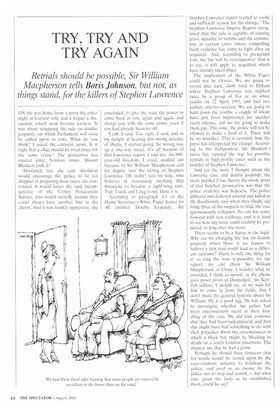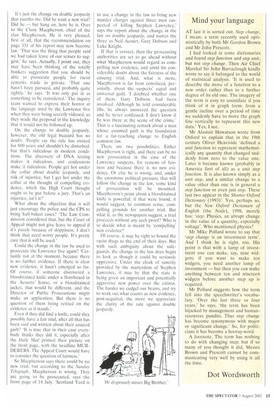TRY, TRY AND TRY AGAIN
Retrials should be possible, Sir William
Macpherson tells Boris Johnson, but not, as
things stand, for the killers of Stephen Lawrence
ON the way home from a party the other night m'learned wife and I began a discussion, which soon became earnest. It was about scrapping the rule on double jeopardy, on which Parliament will soon be called upon to vote. What do you think? I asked the eminent jurist. Is it right that a chap should he tried twice for the same crime? The protection has existed since Norman times. Should Blunkett junk it?
Absolutely not, she said. Abolition would encourage the police to be yet sloppier in preparing their cases, she contended. It would foster the rank incompetence of the Crown Prosecution Service, who would secretly assume they could always have another bite at the cherry. And it was frankly oppressive, she concluded, to give the state the power to come hack at you, again and again, and charge you with the same crime, even if you had already been let off.
Yeah, I said, Too right, I said; and in my delight at hearing this strong defence of liberty, I started going the wrong way up a one-way street. It's all because of that Lawrence report, I told her. An 800year-old freedom, I cried, snuffed out because of Sir William Macpherson and his inquiry into the killing of Stephen Lawrence, Oh really? said my wife, who believes in restraining anything that threatens to become a right-wing rant. Yup. I said, and I dug it out. Here it is.
According to paragraph 4.3 of the Home Secretary's White Paper Justice for All, entitled 'Double Jeopardy', the
Stephen Lawrence report is cited as a sole and sufficient reason for the change. 'The Stephen Lawrence Inquiry Report recognised that the rule is capable of causing grave injustice to victims and the community in certain cases where compelling fresh evidence has come to light after an acquittal.' And, according to paragraph 4.66, the law will be retrospective: that is to say, it will apply to acquittals which have already taken place.
The implication of the White Paper could not be clearer. We are going to revisit that dark, dank road in Eltham where Stephen Lawrence was stabbed twice by a group of five or six white youths on 22 April 1993, and had two axillaty arteries severed. We are going to hunt down the youths, a couple of whom have just been imprisoned for another racist offence, and we are going to make them pay. This time, the police will not be allowed to make a hash of it. There will be no mistakes. That is certainly how the press has interpreted the change. According to the Independent, Mr Blunkett's move has 'opened the way for possible retrials in high-profile cases such as the murder of Stephen Lawrence'.
And yet the more I thought about the Lawrence case, and double jeopardy, the more puzzled I was. Surely the whole point of that botched prosecution was that the police evidence was hopeless. The police dithered and dickered around and failed to lift floorboards, and when they finally did bring three of the suspects to trial, the case ignominiously collapsed. No one has come forward with new evidence, and it is hard to see how any more could credibly be produced, so long after the event.
There seems to be a hiatus in the logic. Why are we changing the law on double jeopardy when there is no reason to believe a new trial could lead to a different outcome? There is only one thing for it: to ring the man responsible for the report, my old chum Sir William Macpherson of Cluny. I wonder what he intended, I think to myself, as the phone goes proot proot in Dunjudgin., his Scottish schloss. I should say, as we wait for him to come in from the fields, that I don't share the general hysteria about Sir William. He is a good egg. He was asked to investigate whether the police had been unconsciously racist in their handling of the case. He did find evidence that they had been lackadaisical, and that this might have had something to do with their prejudice about the circumstances in which a black boy might be bleeding to death on a south London pavement. The chances are that he had a point.
Perhaps he should have foreseen that his words would be seized upon by the race-relations industry to belabour the police, and used as an excuse by the police not to stop and search — hut what else, given the facts as he established them, could he say? It's just the change on double jeopardy that puzzles me. Did he want a new trial? Did he — but hang on, here he is. Over to the Cluny Macpherson, chief of the clan Macpherson. He is very pleased, first of all, that the recommendation on page 331 of his report may now become law. 'That was the thing that people said we had taken leave of our senses to suggest,' he says. Actually, I point out, they may have been thinking of the totally bonkers suggestion that you should be able to prosecute people for racist remarks made in private. 'That one hasn't been pursued, and probably quite rightly,' he says. 'It was only put in as something to be considered.' The inquiry team wanted to express their horror at the language used by the Lawrence five when they were being secretly videoed, so they made the proposal in the knowledge that it would not be followed up.
On the change to double jeopardy, however, the old legal buzzard has no doubt. 'People say the rule has existed for 800 years and shouldn't be disturbed, but that's ridiculous in modern conditions. The discovery of DNA testing makes it ridiculous, and confessions make it ridiculous. People get hot under the collar about double jeopardy, and risk of injustice, but I get hot under the collar at the thought of compelling evidence, which the High Court thought ought to be put before a jury. That's an injustice, isn't it?'
What about the objection that it will just encourage the police and the CPS to bring half-baked cases? 'The Law Commission considered that, but the Court of Appeal might not give leave to appeal if it's purely because of sloppiness. I don't think that need worry people. It's pretty rare that it will be used.'
Could the change in the law be used to prosecute the Lawrence five again? 'Certainly not at the moment, because there is no further evidence. If there is clear new evidence, it hasn't emerged so far. Of course, if someone discovered a bloodstained knife under a floorboard in the Acourts' house, or a bloodstained jacket, that would be different, and the Director of Public Prosecutions might make an application. But there is no question of them being retried on the evidence as it stands.'
Even if they did find a knife, could they possibly have a fair trial, after all that has been said and written about their assured guilt? It is true that in their case everybody thinks they did it, especially after the Daily Mail printed their picture on the front page, with the headline MURDERERS. The Appeal Court would have to consider the question of fairness.'
So Macpherson says there could be no new trial; but according to the Sunday Telegraph, Macpherson is wrong. They are going to be prosecuted, says the front page of 14 July. 'Scotland Yard is
to use a change in the law to bring new murder charges against three men suspected of killing Stephen Lawrence,' says the report about the change in the law on double jeopardy, and names the three as Neil Acourt, Gary Dobson and Luke Knight.
If that is correct, then the prosecuting authorities are set to go ahead without what Macpherson would regard as compelling new evidence, and amid his considerable doubt about the fairness of the ensuing trial. And, what is more, Macpherson is far from convinced, personally, about the suspects' equal and universal guilt. 'I doubted whether one of them, Gary Dobson, had been involved. Although he told considerable fibs, he always answered the question and he never confessed. I don't know if he was there at the scene of the crime.' That is a fascinating remark about a man whose assumed guilt is the foundation for a far-reaching change to English common law.
There are two possibilities. Either Macpherson is right, and there can he no new prosecution in the case of the Lawrence suspects, for reasons of fairness and because there is no new evidence. Or else he is wrong, and, under the enormous political pressure that will follow the change in the law, some kind of prosecution will be mounted. Macpherson's point about a bloodstained knife is powerful; if that were found, it would suggest, to common sense, compelling grounds for another trial. But what if, as the newspapers suggest, a trial proceeds without any such proof? Who is to decide what is meant by 'compelling' new evidence?
Of course, it may be right to hound the racist thugs to the end of their days. But with such ambiguity about the safeguards, the change in the law does begin to look as though it could be seriously oppressive. Under the cloak of sanctity provided by the martyrdom of Stephen Lawrence, it may be that the state is being given an important and potentially aggressive new power over the citizen. The harder we cudgel our brains, and try to work out what counts as new evidence, post-acquittal, the more we appreciate the clarity of the rule against double jeopardy.



























































 Previous page
Previous page